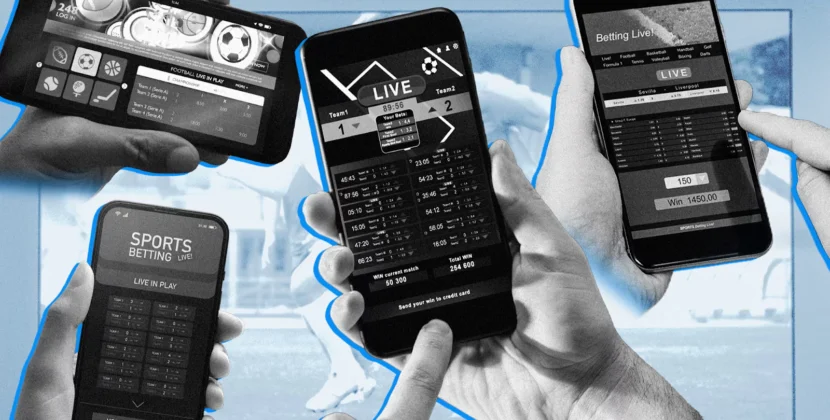
The landscape of sports betting is undergoing a significant transformation, driven by innovations in technology and shifting consumer preferences. As the industry continues to grow, new trends are shaping the future of how people engage with sports betting. This article explores these technological advancements and changing consumer behaviors that are poised to revolutionize sports betting in the coming years.
1. Mobile Betting and Accessibility
One of the most noticeable changes in sports betting is the rise of mobile betting platforms. With the widespread use of smartphones and continuous improvements in mobile technology, betting is no longer confined to desktop computers or land-based casinos. Mobile apps now allow users to place bets on their favorite sports events from virtually anywhere. Bettors can access live odds, track their bets, and engage with sportsbooks on-the-go, providing a level of convenience that was unimaginable just a few years ago. As mobile technology improves, the overall user experience is becoming more seamless, with faster load times, intuitive interfaces, and additional features like live streaming and in-app cashouts.
2. Virtual Reality and Immersive Betting Experiences
The future of sports betting is also being shaped by immersive technologies like virtual reality (VR). With VR, sports bettors will be able to place their wagers in a highly interactive and realistic environment. Instead of just watching a game on TV or a laptop screen, VR allows users to feel as though they are sitting in the stadium, surrounded by the sights and sounds of the game. This immersive experience could enhance fan engagement and provide new ways for users to interact with live events, turning betting into an even more dynamic and thrilling experience. Imagine attending a live virtual match, making bets in real-time, and interacting with other bettors in a shared virtual space. VR could redefine how fans engage with sports events, offering a level of immersion that enhances both the betting and viewing experience.
3. The Role of Data Analytics and Artificial Intelligence
Another critical component shaping the future of sports betting is the rise of data analytics and artificial intelligence (AI). Sportsbooks are increasingly turning to these technologies to enhance the accuracy of their betting odds and improve the overall betting experience. AI algorithms can analyze vast amounts of data, including player statistics, game history, and even real-time events, to generate more precise predictions. Bettors can use this information to make more informed decisions, increasing the potential for success. In addition, AI and machine learning can power live betting opportunities, where users place wagers while a game is in progress. This dynamic form of betting is growing in popularity and offers bettors the chance to capitalize on in-game trends and events as they unfold. By using data-driven insights, AI makes the betting process faster, more accurate, and more personalized.
4. The Growth of Esports Betting
Esports, or competitive gaming, has rapidly gained popularity over the past decade and is becoming an integral part of the sports betting landscape. Events like the League of Legends World Championship and the CS:GO Major attract millions of viewers and bettors worldwide. Sportsbooks are now expanding their offerings to include esports betting, catering to a younger audience that is more familiar with gaming culture. This shift not only broadens the scope of available markets but also introduces a new set of challenges for bettors. Esports betting often requires specialized knowledge of the games and players involved, adding a layer of complexity to the betting process. However, this new avenue offers an exciting opportunity for sports betting companies, as well as bettors looking for fresh and innovative ways to engage with sports.
5. Social Betting and Community Engagement
Sports betting is becoming increasingly social, thanks to the rise of online communities and social media platforms. In the future, bettors will be able to share their experiences, tips, and strategies with friends or even strangers, creating a sense of camaraderie around sports betting. Many platforms are already implementing social betting features that allow users to interact, share their bets, and engage in friendly competition. These features help create a community-driven experience that makes sports betting more enjoyable and accessible. Social media is also playing a big role, with influencers and betting experts sharing tips, analysis, and predictions that help shape the betting landscape. The future of sports betting will likely include even more interactive and social features that cater to the growing desire for connection and engagement within the betting community.
6. Conclusion
As the sports betting industry continues to evolve, technological innovations and changing consumer preferences will play an essential role in shaping its future. Mobile betting platforms offer increased convenience and accessibility, while virtual reality and immersive technologies will enhance fan engagement and betting experiences. The use of data analytics and AI will enable more accurate predictions and real-time betting opportunities. Meanwhile, esports betting is opening up new markets and attracting younger audiences, and social betting is fostering a sense of community among bettors.
In the coming years, sports betting will likely become an even more dynamic and interactive experience, driven by technological advancements that enhance both the betting process and the fan experience. As these trends continue to evolve, the future of sports betting looks brighter than ever, offering bettors an exciting and innovative way to engage with their favorite sports.











Recent Comments